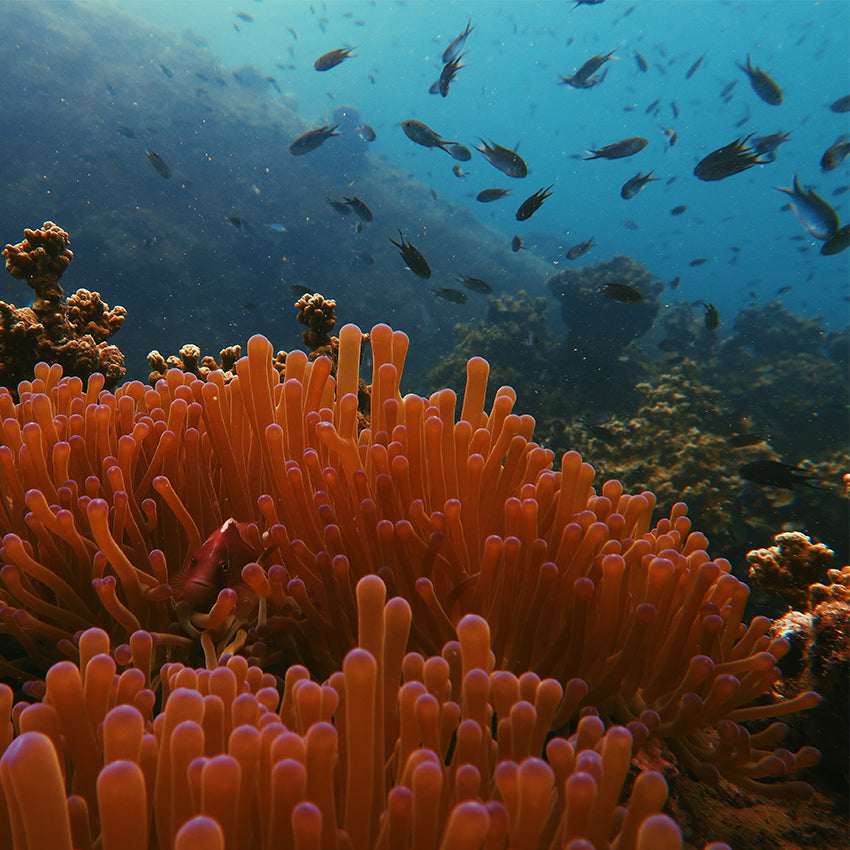
Holding 97% of the earth’s water, regulating weather throughout the globe and producing more than half of the world’s oxygen, the deep blue seas truly support all life on earth. Since the industrial revolution, human activity has negatively affected our waters and the rates of pollution are rapidly increasing. The now contaminated oceans are warming and sea levels are rising.1 Given the current state of our waters and the ecosystems that depend on it, it is more crucial than ever to take action towards ocean conservation. We can all make a difference in saving the ocean - here’s how.

Say no to single-use plastic
It takes hundreds of years for plastic to completely break down and with the amount of plastics we are throwing away (up to 12.7 million tonnes will end up in the ocean each year) it’s a clear sign that we need to take action.2 Single-use plastics such as bags, sachets, straws and containers account for the majority of plastic waste.3 Do your part to protect the ocean by adopting the habit of using reusable shopping bags, coffee cups, utensils and takeaway containers. When shopping, look out for items with less plastic packaging.
Choose sustainable seafood
Overfishing is one of the biggest threats to a thriving marine ecosystem. Over the last fifty years, overfished stocks have tripled, leaving marine life like abalone, freshwater eel, grouper and various species of tuna under serious threat. In Singapore alone, WWF reports that 75% of all 120,000 tonnes of seafood consumed each year is unsustainable.4

Reduce your carbon footprint
Reducing your carbon emissions helps to reduce climate change and the subsequent warming of our seas.5 Thankfully there are countless ways to do so. Eating less meat, or going vegetarian or vegan makes the most impact. However, you can also make a difference by using public transportation, reducing air travel, cycling, planting trees, buying less, and choosing local products. Reducing your power consumption by better insulating your home, unplugging your devices, upgrading to more energy efficient appliances and switching to LED lights can also go a long way in saving the ocean.6
Opt for ocean-friendly toiletries
All water on earth is connected: what ends up being washed down our bathroom drains eventually ends up in the ocean. Microbeads, which were commonly found in cosmetics before being banned in 2018, were traced to the stomachs of sea creatures such as whales, seabirds and turtles.7 Traces of parabens, harmful synthetic ingredients found in several cosmetics, have also been found in marine mammals such as dolphins and sea otters.8 Be diligent about checking the labels of your toiletries and steer clear of microbeads (check the label for polyproplene and polyethylene); BHA and BHT; non-biodegradable silicones (look out for siloxanes, cyclomethicone and cyclotetrasiloxane); and triclosan.9
Switch to mineral sunscreen
Conventional sunscreens made with chemical UV filters such as oxybenzone and octinoxate have been found to cause coral bleaching, leading to ban of chemical sunscreens in regions like Hawaii and Palau.10 Thankfully as we educate ourselves on the impact these products have on the environment, we can opt for reef-safe alternatives. Mineral sunscreens, with non-nano minerals Zinc Oxide or Titanium Dioxide as active ingredients, are completely safe for coral reefs—not only providing skin with broad spectrum protection against UVA and UVB rays, but eventually settling onto the seabed as part of its natural sediment.
Banyan Tree's Coconut and Seaweed Mineral Sunscreen SPF 30 is coral-reef safe with 100% non-nano mineral UV blockers. Infused with skin-loving organic Virgin Coconut Oil, Red Seaweed Extract and Spirulina Extract, our marine-friendly sunscreen provides broad spectrum protection without white cast, and is 94.5% naturally derived.
By Marisse Gabrielle Reyes
To shop, or to learn more about Banyan Tree products, visit Natural Bath & Body Spa Products | Formerly Banyan Tree Gallery – Banyan Tree Essentials
For any enquiry, contact us at essentials@banyantree.com.
References
1) Nunez, C. (2019, March 21). Our oceans are under attack by climate change, overfishing. Retrieved July 26, 2019, from https://www.nationalgeographic.com/environment/habitats/ocean/
2) Bullock, S. (2018, June 8). Key facts about plastic pollution. Retrieved July 26, 2019, from https://www.greenpeace.org/usa/key-facts-about-plastic-pollution/
3) Kirk, A., Mills. E., Molloy, M., Wright. M. (2018, January 10). The stark truth about how long your plastic footprint will last on the plant. Retrieved July 26, 2019, from https://www.telegraph.co.uk/news/2018/01/10/stark-truth-long-plastic-footprint-will-last-planet/
4) Grooten, M., Almond, R.E.A.(Eds). (2018). Living planet report: aiming higher.
5) Knutti, R. (2013). Relationship between global emissions and global temperature rise. Retrieved July 26, 2019 from https://unfccc.int/sites/default/files/7_knutti.reto.3sed2.pdf
6) Smithsonian Ocean Team. (2009, December). How you can help the ocean. Retrieved July 26, 2019 from https://ocean.si.edu/conservation/climate-change/how-you-can-help-ocean
7) Street, C. (2018, January 10). Bye bye microbeads: the plastic-free scrubs and exfoliators to use now. Retrieved July 26, 2019 from https://www.standard.co.uk/beauty/news/microbead-ban-scrubs-exfoliators-to-use-a3736851.html
8) Parabens and their byproducts found in dolphins and other marine mammals. (2015, October 14). Retrieved July 26, 2019 from https://www.acs.org/content/acs/en/pressroom/presspacs/2015/acs-presspac-october-14-2015/parabens-and-their-byproducts-found-in-dolphins-and-other-marine-mammals.html
9) Rebecca. (2016, April 18). 7 Cosmetic ingredients that are bad for the environment. Retrieved July 29, 2019 from https://cvskinlabs.com/7-cosmetic-ingredients-that-are-bad-for-the-environment/
10) Rosen, E., Zachos, E. (2019, May 22). What sunscreens are best for you - and the planet? Retrieved July 26, 2019 from https://www.nationalgeographic.co.uk/environment/2019/05/what-sunscreens-are-best-you-and-planet



